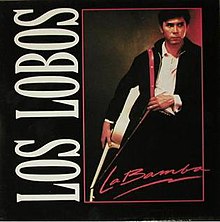La Bamba (song)
| "La Bamba" | ||||
|---|---|---|---|---|
| Single by Ritchie Valens | ||||
| from the album Ritchie Valens | ||||
| A-side | "Donna" | |||
| Released | October 18, 1958 | |||
| Format | 7" | |||
| Recorded | 1958 | |||
| Genre | ||||
| Length | 2:06 | |||
| Label | Del-Fi | |||
| Writer(s) | adapted by Ritchie Valens | |||
| Producer(s) | Bob Keane | |||
| Ritchie Valens singles chronology | ||||
|
||||
| "La Bamba" | ||||
|---|---|---|---|---|
 |
||||
| Single by Los Lobos | ||||
| from the album La Bamba Original Motion Picture Soundtrack | ||||
| B-side | "Charlena" | |||
| Released | June 20, 1987 | |||
| Format | ||||
| Recorded | 1986 | |||
| Genre | ||||
| Length | 2:54 | |||
| Label | Warner Bros. | |||
| Writer(s) | Ritchie Valens | |||
| Producer(s) | Los Lobos | |||
| Los Lobos singles chronology | ||||
|
||||
"La Bamba" (pronounced: [la ˈβamba]) is a Mexican folk song, originally from the state of Veracruz, best known from a 1958 adaptation by Ritchie Valens, a top 40 hit in the U.S. charts and one of early rock and roll's best-known songs. Valens' version of "La Bamba" is ranked number 354 on Rolling Stone magazine′s list of the 500 Greatest Songs of All Time. It is the only song on the list sung in a language other than English.
"La Bamba" has been covered by numerous artists, most notably by Los Lobos, whose version was the title track of the 1987 film La Bamba and reached No. 1 in the U.S. and UK singles charts in the same year. The Los Lobos version remained No. 1 for three weeks in the summer of 1987. The music video for Los Lobos' version, directed by Sherman Halsey, won the 1988 MTV Video Music Award for Best Video from a Film.
"La Bamba" is a classic example of the Son Jarocho musical style, which originated in the Mexican state of Veracruz and combines Spanish, indigenous, and African musical elements. The song is typically played on one or two arpas jarochas (harps) along with guitar relatives the jarana jarocha and the requinto jarocho. Lyrics to the song vary greatly, as performers often improvise verses while performing. However, versions such as those by musical groups Mariachi Vargas de Tecalitlan and Los Pregoneros del Puerto have survived because of the artists' popularity. The traditional aspect of "La Bamba" lies in the tune, which remains almost the same through most versions. The name of the dance, which has no direct English translation, is presumably connected with the Spanish verb bambolear, meaning "to shake" or perhaps "to stomp".
...
Wikipedia
